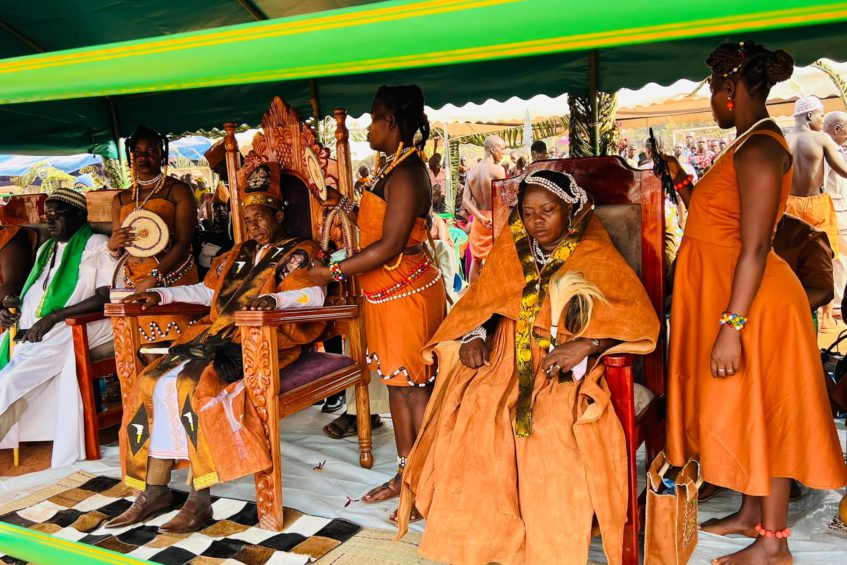
Atoroba Peni Rikito, the New King of Azande Kingdom on Gbudue Day on 9th Feb. 2022. Photo credit: Richard Ruati
Atoroba Peni Rikito Gbudue has been installed as the King of Azande for the first time in more than 100 years after the death of King Gbudue in 1905.
The great-grandson of King Gbudue has been installed on Wednesday afternoon as the Kingdom’s hirer on Gbudue day.
February 9 (Gbudue Day) is a cultural day agreed upon to be celebrated yearly by the Azande of South Sudan, inside and in the Diaspora to remember, honor, and celebrate the life of King Gbudue.
According to the Rift Valley Institute, Gbudue was a royal Azande leader and arguably the most prominent person in the recent history of the Azande people, who are residents in the central and western parts of South Sudan’s Equatoria regions.
During his rule, Gbudue faced incursions from ivory and slave traders, Egyptian Government officials, officials in the Mahdia, British, and Belgium forces—as well as participating in internal Zande wars.
He was killed during a British patrol led by Major Boulnois in February 1905.
However, there are different versions of Gbudue’s death.
The anthropologist Evans-Pritchard, an English man, put together various accounts, based on Zande oral histories collected during doctoral research between 1926 and 1930.
These suggest that Gbudue was shot in the arm when the patrol entered his homestead.
He then shot three members of the patrol and injured a donkey that had been brought to transport him to the military post at Birekiwe, the original name of the current Yambio County.
In doing so, the British soldiers were forced to carry Gbudue on a stretcher to a hut where he was put under guard and succumbed to his injuries. Some accounts suggest he died alone, others that one of his wives, a daughter of Tangili, was with him
After his death, the Anglo-Egyptian military administration received intelligence that some of Gbudue’s sons were planning an armed revolt and in January 1914, Mange, Basongoda, Mopoi and Gangura were sent as prisoners to Wau and on to Khartoum.
With the exception of Basongodo, who died in Wau, they were eventually released and returned home.
Ever since his demise, the Azande has never had a successor for more than a century now.
Today, Gbudue has become a symbol of anti-colonial nationalism.
The new description of him as a ‘Martyr’ at his grave ascribes him a place in the South Sudanese liberation struggle.
For many Azande people, his rule represents a golden era before the disruptions of colonization and war.
To make his legacy stay, there have been calls, including from Gbudue’s great-grandson Atoroba Peni Rikito Gbudue, to revive traditional authorities and the Zande Kingdom, of which Gbudue was the last ruler.
The Azande are a Bantu group and their language is similar to the other Bantu languages. Approximately five dialects of Azande are spoken throughout the area they occupy.
Today’s celebration in Western Equatoria state is being attended by elders, chiefs, women, youth, children, religious leaders, civil society activists and some Azande from across the country and the diaspora.
Senior government officials are also attending the historical event.
These include the speaker of the new unity parliament, Jemma Junu Kumba, minister of presidential affair, Dr. Barnaba Marial Benjamin and the governor of Central Equatoria state, Emmanuel Adil among others.
Support Eye Radio, the first independent radio broadcaster of news, information & entertainment in South Sudan.
Make a monthly or a one off contribution.
Copyright 2024. All rights reserved. Eye Radio is a product of Eye Media Limited.